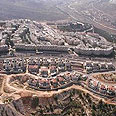
Despite US pressure, Gilo to be expanded
Regional committee approves construction of 900 new housing units in south Jerusalem, neighborhood located beyond Green Line, on backdrop of new demand made by American special envoy to halt building in area. 'The United States is not a factor,' committee member tells Ynet
American pressure against construction in east Jerusalem continues to mount, but Israel shows no signs of folding. On the backdrop of the new American demand to freeze construction in the Jerusalem neighborhood of Gilo, the regional committee for planning and construction on Tuesday approved a motion to expand Gilo and south Jerusalem and build 900 new housing units in the neighborhood.
"The fact that the United States is against this or not is not a factor," one of the committee members told Ynet. "According to what is accepted at the moment, this territory belongs to Jerusalem and to Israel, and thus the Israeli planning and construction law applies to it and the committee must discuss the plan."
He stressed, however, that this was only the beginning of a long bureaucratic process.
The Yedioth Ahronoth daily reported about the new dispute on Tuesday morning, following a demand made Monday evening by US special envoy to the Middle East George Mitchell in a meeting with Prime Minister Benjamin Netanyahu's emissaries.
Mitchell demanded an immediate stop to the construction in the neighborhood, which is located beyond the Green Line, after receiving information about the expected approval.
An official at the Prime Minister's Office told the newspaper in response that "this is a routine procedure being held at the regional committee," stressing that "the Gilo neighborhood is an integral part of united Jerusalem, and there is no difference between building there and building in Tel Aviv or Haifa."
Topographic problem only
The project outline was approved by the committee without any objections. After the amendment stage, it will be transferred to a "deposit" for 60 days, during which the public will be able to submit its reservations. This is when the pressure of the Palestinians, Americans and left-wing organizations is expected to resume.
The committee members learned of the discussion on new housing units only early last week. "The only problem was that the neighborhood would be expanded on an area which is defined today as an open space on the margins of the Gilo Park," one of the committee members explained.
"This is an area with a difficult topographic problem, which places challenges and problems for planning and implementation. The area was designated at the time for development, and a lot of work was invested in it in order to deal with these problems."
Gilo's residents expressed their anger at the American demand on Tuesday morning. Meir Turgeman, a Jerusalem council member and chairman of the Gilo neighborhood board during the second intifada, blamed the situation on what he called "collaborators who went and leaked it out."
"I don't believe that the Americans are up to date on the construction situation in Gilo and they aren't interested in it either," he told Ynet. "This came from within. There are people in this country and on the city council who are collaborating with external bodies who don't have Jerusalem's best interests at heart."
The report also infuriated Knesset Speaker Reuven Rivlin, who said during a meeting with Lithuanian Ambassador to Israel Darius Degutis that "a demand like the one being made by the Americans, who oppose the issuing of construction permits in the Gilo neighborhood, pushes us beyond a red line that we cannot afford to cross, and is not legitimate."
Gilo's residents remember all too well the events that took place in their neighborhood at the start of the decade, when their homes became a target for attacks from the neighboring Palestinian town of Beit Jala for many months.
At the time, the situation sparked a global dispute on the status of the neighborhood, which was built on lands occupied during the Six Day War. Following pressure exerted by pro-Israel groups, the managers of the American CNN network issued an instruction to stop referring to Gilo as a "settlement" and call it a "Jewish neighborhood."















